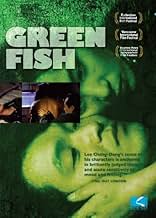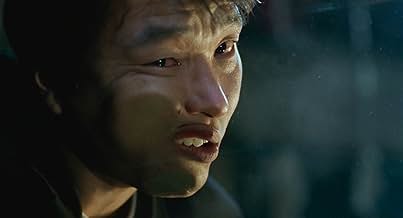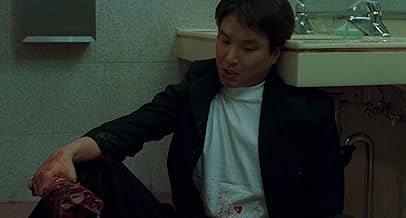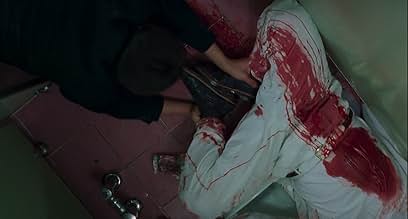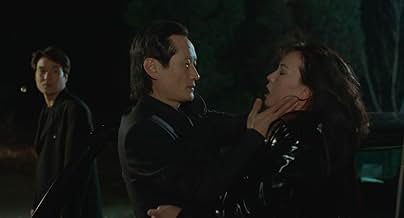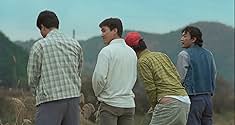IMDb RATING
7.0/10
2.4K
YOUR RATING
Returning home and finding his town drastically changed, a former soldier falls in with gangsters.Returning home and finding his town drastically changed, a former soldier falls in with gangsters.Returning home and finding his town drastically changed, a former soldier falls in with gangsters.
- Awards
- 20 wins & 6 nominations total
Kim Dong-gon
- Sandwich Man
- (as Dong-gon Kim)
Lee Ho Sung
- Elder brother
- (as Ho-Sung Lee)
Park Hye-Sook
- 3rd Brother's wife
- (as Hye-sook Park)
- Director
- Writer
- All cast & crew
- Production, box office & more at IMDbPro
Featured reviews
Green Fish is not a real gangster movie, but more an illustration of the battle between good and evil, between innocence and depravity, between the righteous one and those who only believe in the law of the strongest, between the city (and all its poisons) and the countryside (with its green fish). The law of the strongest is not only a matter of physical forces (strength, number), but also of mental ones (deception, manipulation, ambush, cynicism of the individual). The film has also a socio-economic dimension: the protagonist of the movie is a young man who has been released from the army. He has no job, but is hired by the immoral leader of a gang who appreciates his courage, his sincerity and his 'morality' (his sense of justice). And the women in all that? They have no other choice but to follow the strongest, if, and only if, they are young and beautiful. As for the unborn child, there is more than serious doubt about the real father
The first film by Lee Chang-dong contains already many ingredients of his later movies: a train, spasticity, gratuitous violence or exploitation of innocence. It says a lot about the director's vision on the way of the world.
The first film by Lee Chang-dong contains already many ingredients of his later movies: a train, spasticity, gratuitous violence or exploitation of innocence. It says a lot about the director's vision on the way of the world.
Lee Chang-dong's debut film reflects a changing Korea, one where apartment high rises have sprung up in the outskirts of Seoul while a young man has been away for his compulsory military service. He's as powerless to stop it as he is to stop the assault of woman on the train he comes in on, and that's one of the themes here, powerlessness coming along with the loss of innocence in a Korea that dehumanizes as it modernizes. He can't get a decent job and he can't stop his family from devolving into chaos, with one brother drinking too much. He's soon sucked in to a gang with a rigid power structure, more than once having to just stand there and take physical punishment, though we see that even "big brother" has a "big brother," making one wonder where the hierarchy ends. The film is well made and almost certainly more meaningful to Koreans in the late 90's, but to me it was dreary and uninspiring, with too much emphasis on the gangster element, even if it was nice to see Song Kang-ho in just his second film. I could have done without the chicken beheading though.
I see this as a film about how hard it is to do the right thing in the complex modern world. Makdong's family used to own acres of farmland that are now covered in ugly apartment buildings and now they get by selling eggs to the residents. All Makdong wants to do is make this easier for his family and in the process he becomes a gangster just to get by. Even the gangsters are between doing the right thing and doing what they must to survive. Makdong's "Big Brother" likes to think of himself as different from the other thieves and killers that make up the underworld but in the end he is no better.
I saw this a few years ago and remember it as sad, graceful and often funny, with a few strikingly memorable images, like the one of the glowering night club singer. Its story of a young Korean man from a loving but troubled home who ends up working for the local hoods is not wildly original, but it's well done. It is kind of unassuming and low-key, so that when the credits trekked over the final scene (which the audience rightly applauded) I was surprised at how touched I was, and I remember it overall with more clarity than most films I see.
This is director Lee Chang-Dong's first film (of three) and the third that I've seen after his well-made films Peppermint Candy and Oasis. It's a story of a young man who is recently discharged from the standard military service that young Corean men are required to serve and finds that life, or the real world, is a lot harsher than his idealistic self would've expected. He soon finds himself dragged into the Corean underworld out of necessity and finds his idealism and the idealism of all those around him at odds with reality.
In a greater sense, this film is about the constant struggle between chasing your dreams and dealing with the harsh reality. All the primary characters, the mob boss, the female lead and the protagonist all have their dreams and ambitions (building a great property from the ashes of his youth, escaping the prostitute's life and living a normal one, owning a restaurant with his family), but are struck by the world's reality, which forms itself as an enemy mob, the mob bosses' controlling nature and the young protagonist's dysfunctional family.
It's a study of the nature of the relatively modern world (of Corea) and the inevitable clash of youthful idealism and experienced reality. And it doesn't take too many sides either, although the ending does seem to show that action, and sacrifice, even unintended, is what's necessary to keep yourself from being beaten down by reality.
It's a slowly-paced art film with quiet but contemplative character development, modest acting and capable directing. Directer Lee still hasn't fully gained a strong grasp of storytelling yet as a director at this point as the film as it's sometimes difficult to make out why anything's happening in the film, but the potential shows as well, with honest characters and patient development. A good start, but you can see the Director side of Lee Chang-Dong really start to pick up with his later films. It's decent. 7/10.
In a greater sense, this film is about the constant struggle between chasing your dreams and dealing with the harsh reality. All the primary characters, the mob boss, the female lead and the protagonist all have their dreams and ambitions (building a great property from the ashes of his youth, escaping the prostitute's life and living a normal one, owning a restaurant with his family), but are struck by the world's reality, which forms itself as an enemy mob, the mob bosses' controlling nature and the young protagonist's dysfunctional family.
It's a study of the nature of the relatively modern world (of Corea) and the inevitable clash of youthful idealism and experienced reality. And it doesn't take too many sides either, although the ending does seem to show that action, and sacrifice, even unintended, is what's necessary to keep yourself from being beaten down by reality.
It's a slowly-paced art film with quiet but contemplative character development, modest acting and capable directing. Directer Lee still hasn't fully gained a strong grasp of storytelling yet as a director at this point as the film as it's sometimes difficult to make out why anything's happening in the film, but the potential shows as well, with honest characters and patient development. A good start, but you can see the Director side of Lee Chang-Dong really start to pick up with his later films. It's decent. 7/10.
Did you know
- ConnectionsFeatured in Son-nim-eun-wang-e-da (2006)
- How long is Green Fish?Powered by Alexa
Details
- Runtime1 hour 51 minutes
- Color
- Sound mix
- Aspect ratio
- 1.85 : 1
Contribute to this page
Suggest an edit or add missing content

